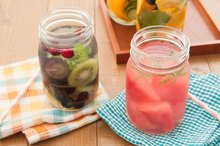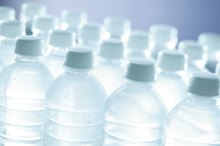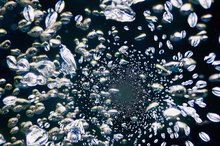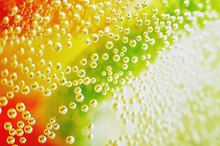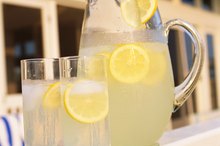Is Too Much Vitamin Water Bad for You?
Vitamin water -- flavored water that contains added vitamins -- seems like the perfect way to get the fluids you need. However, despite their healthy-sounding name, vitamin water comes loaded with added sugar. You can consume it as an occasional treat, but don't expect it to contribute to the nutritional value of your diet.
About Vitamin Water
Vitamin water is sold in a variety of exotic fruit flavors such as dragonfruit, tropical citrus, well as classics, such as lemonade and orange flavors. Several manufacturers of vitamin water include combinations of various essential vitamins and minerals, and even caffeine, in its products that claim to enhance the water's health benefits such as the ability to fight stress, help you focus or give you more energy. An August 2010 article in the "Huffington Post" critically describes the vitamin waters as sugar-water with a "penny's worth of synthetic vitamins" added into the mix.
Concerns
Vitamin Water Health Facts
Learn More
Too much vitamin water can be bad for your weight. It's the added sugar calories that add up, says the Center for Science in the Public Interest. For example, one brand of orange-flavored vitamin water contains 50 calories per serving; however, it's important to note that a serving size is only 1 cup -- many bottles contain two and a half servings. If you drink the whole bottle, you'll consume 125 calories, slightly less than you would if you drank a 12-ounce soft drink, which has 150 calories. Many types of vitamin water contain added sugar -- which contributes to their calorie count -- which means they don't have a regular place in a healthy diet.
- Too much vitamin water can be bad for your weight.
- Many types of vitamin water contain added sugar -- which contributes to their calorie count -- which means they don't have a regular place in a healthy diet.
Other Information
Some food manufacturers also offer low- or no-calorie versions of sweetened vitamin water. However, they still pale in comparison to whole foods -- such as fruits, veggies, low-fat dairy and lean proteins -- as sources of essential nutrients. If you eat healthfully, you don't need a nutrient-enhanced drink that may only contribute calories to your diet.
Better Beverages
Is Fruit-Flavored Water Good for You?
Learn More
Vitamin water can get expensive, if you drink it regularly in place of regular water. The Harvard School of Public Health suggests less costly options, if you're watching your weight, starting with plain water. Squeeze a little lemon or lime in your water, if you want added flavor, or drink cold unsweetened tea. You can make your own slightly-sweetened beverage by adding a splash of 100 percent fruit juice to regular water or unsweetened carbonated water.
- Vitamin water can get expensive, if you drink it regularly in place of regular water.
- You can make your own slightly-sweetened beverage by adding a splash of 100 percent fruit juice to regular water or unsweetened carbonated water.
Related Articles
References
- "Huffington Post"; The Dark Side of Vitaminwater; J. Robbins; August 2010
- Harvard School of Public Health: Added Sugar in the Diet
- Harvard School of Public Health: Healthy Drinks
- Ohashi Y, Sakai K, Hase H, Joki N. Dry weight targeting: The art and science of conventional hemodialysis. Semin Dial. 2018;31(6):551-556. doi:10.1111/sdi.12721
- Beverages, water, tap, drinking. FoodData Central. U.S. Department of Agriculture. Published April 1, 2019.
- Dietary reference intakes for water, potassium, sodium, chloride, and sulfate. National Academies Press, 2005.
- Jéquier E, Constant F. Water as an essential nutrient: The physiological basis of hydration. Eur J Clin Nutr. 2010;64(2):115-23. doi:10.1038/ejcn.2009.111
- Popkin BM, D'Anci KE, Rosenberg IH. Water, hydration, and health. Nutr Rev. 2010;68(8):439-4358. doi:10.1111/j.1753-4887.2010.00304.x
- Adan A. Cognitive performance and dehydration. J Am Coll Nutr. 2012;31(2):71-8. doi:10.1080/07315724.2012.10720011
- Dennis EA, Dengo AL, Comber DL, et al. Water consumption increases weight loss during a hypocaloric diet intervention in middle-aged and older adults. Obesity (Silver Spring). 2010;18(2):300-307. doi:10.1038/oby.2009.235
- National Institutes of Health Genetic and Rare Diseases Information Center. Aquagenic urticaria. Updated June 20, 2016.
- Centers for Disease Control and Prevention. Well testing. Updated April 10, 2009.
Writer Bio
Lisa Sefcik has been writing professionally since 1987. Her subject matter includes pet care, travel, consumer reviews, classical music and entertainment. She's worked as a policy analyst, news reporter and freelance writer/columnist for Cox Publications and numerous national print publications. Sefcik holds a paralegal certification as well as degrees in journalism and piano performance from the University of Texas at Austin.

